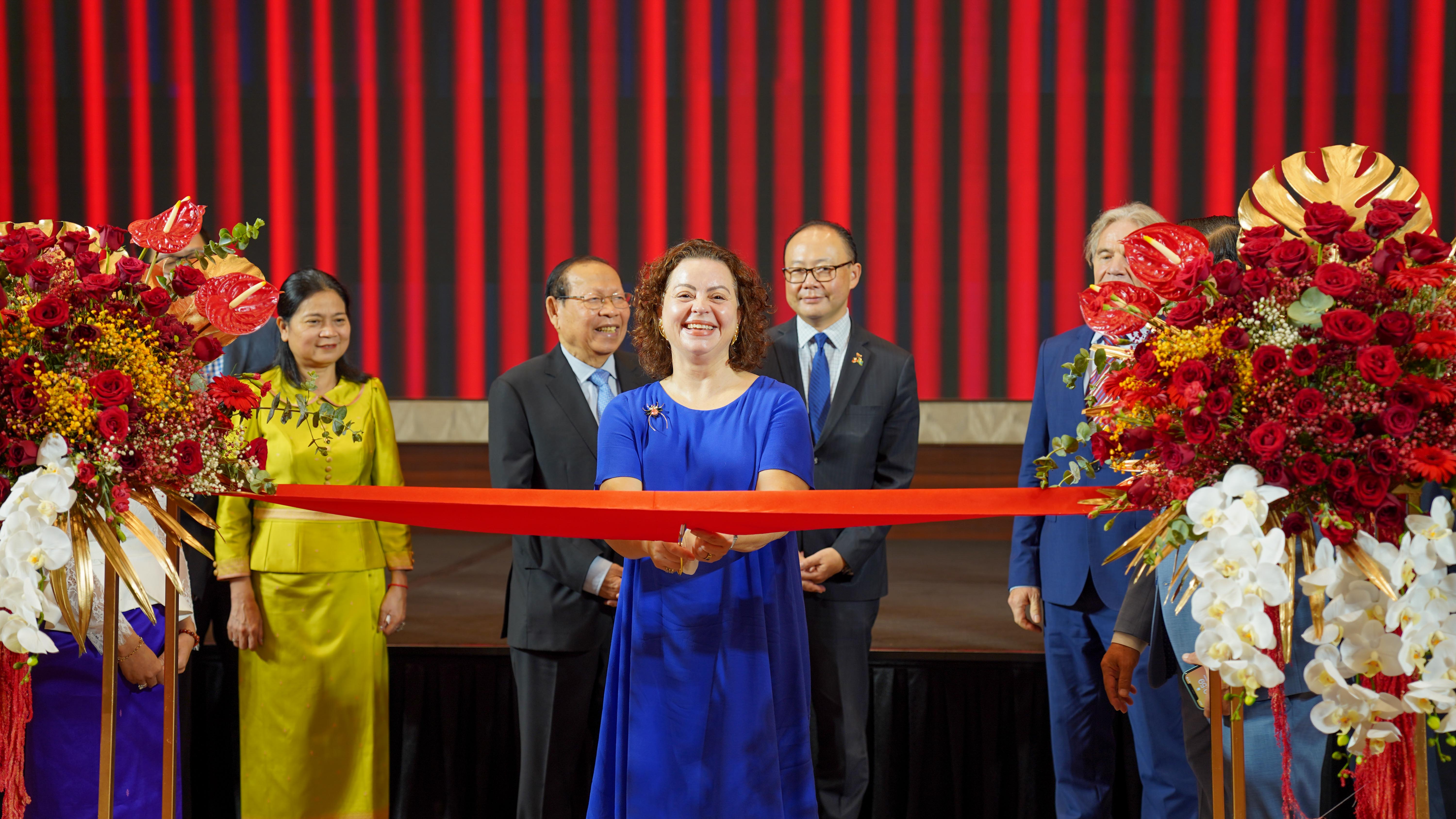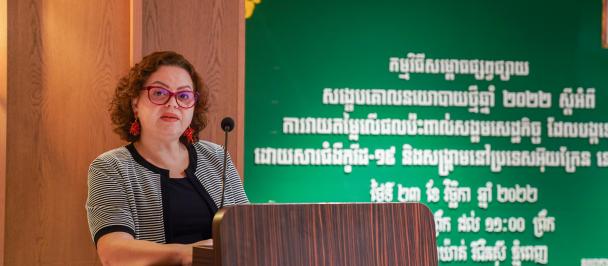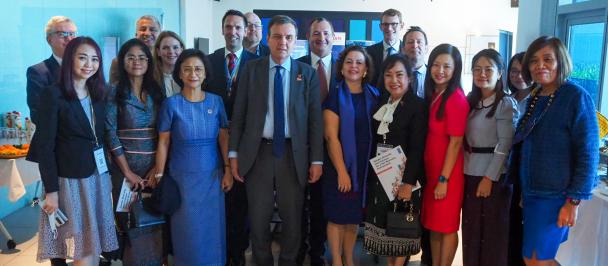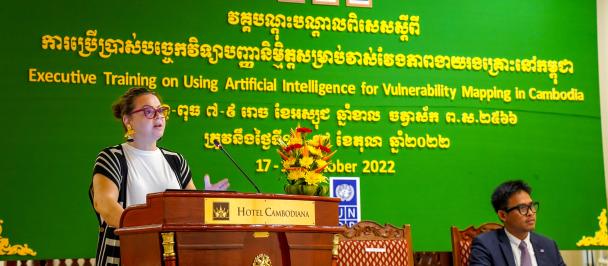Opening Remarks by Ms. Alissar Chaker, UNDP Cambodia's Resident Representative
Launch of the New IDPoor Procedures and Expansion to At-Risk Households
October 12, 2022

Excellency Chhay Than, Senior Minister and Minister of Planning
Excellency Pablo Kang, Australian Ambassador to the Kingdom of Cambodia
Excellency Stefan Messerer, German Ambassador to the Kingdom of Cambodia
Mr. Günter Riethmacher, Country Director, GIZ Cambodia
Excellencies, Colleagues, Friends of the media, Ladies and Gentlemen,
Allow me to begin by expressing my appreciation to our partners, the Ministry of Planning, the Australian Department of Foreign Affairs and Trade, the World Bank, and the Deutsche Gesellschaft für Internationale Zusammenarbeit (GIZ).
In 2011, the Royal Government of Cambodia confirmed IDPoor as the country’s official poverty targeting and identification mechanism to be used nationwide. Since then, the IDPoor mechanism has been instrumental for the implementation of various social protection programmes and interventions, such as the cash transfer programme for pregnant women and children under 2 years of age, the disability allowance, the Health Equity Fund, the Scholarship Programme for Poor Children, and the COVID-19 Cash Transfer Programme for poor and vulnerable households and persons with disabilities, the elderly and people living with HIV/AIDS, to name a few.
The IDPoor is the fruit of concerted and diligent efforts by different development partners under the leadership of the Ministry of Planning. The latest milestone being the recalibration of the IDPoor questionnaire, its scoring system and the IDPoor procedures to improve the efficiency, inclusiveness and targeting of poor and vulnerable households, in line with the principle of Leaving No One Behind. Kudos to H.E. Theng Pagnathun, Delegate of the Royal Government in charge of the General Department of Planning and H.E. Keo Ouly, Director of IDPoor Department and their teams; and to the World Bank, GIZ and UNDP technical teams for their unfaltering commitment and follow up. This could not be achieved without also the valuable insights from champions in several other government institutions, development partners and civil society organizations consulted during the process.
Excellencies, Ladies and Gentlemen,
UNDP support to IDPoor is in line with its conviction that social protection is an investment in people rather than a mere cost. This has been corroborated by macroeconomic analyses and the COVID-19 Cash Transfer Programme evaluation done with the Ministry of Economy and Finance in Cambodia and the General Secretariat for National Social Protection Council (GS-NSPC), and the UNDP latest flagship Human Development Report 2022. When COVID-19 hit in mid-2020, the timely support by the Government of Australia and UNDP allowed the Royal Government to roll out rapidly a campaign in all the 1,646 communes in the country to identify and register poor and vulnerable families. This was possible thanks to equipment, software, and training for field officers whose hard work I would like to recognize in this forum. These efforts resulted in the first ever cash transfer programme in terms of magnitude and reach in the history of the Kingdom. After 27 months and as of September 2022, approximately US$ 806 million have been transferred, benefitting 700,000 households and more than 63,000 persons with disabilities, 360,000 old persons and 2,000 people living with HIV/ AIDS. The COVID Cash Transfer programme has slowed down the speed of losing development gains achieved by the Kingdom in terms of GDP, poverty, and employment.
Growing global turmoil has led to unprecedented reversals in human development progress in 90 percent of the countries. The pandemic, compounded by inequalities, climate shocks, rapid technological innovation, and social mistrust, has further accelerated the decline. Cambodia has lost during the last 2 years of the pandemic hard earned development gains and has regressed to the 2018 human development status. The is sad news, but I should also note that this is above the global average equal to a regression to the 2016 status. This means that Cambodia’s response was efficient in slowing and limiting the losses.
In addition to the revision of IDPoor questionnaire mentioned earlier, a digital citizen-centric stakeholder feedback and accountability mechanism was developed in partnership with GIZ to enhance public participation and provide inputs for continuous improvements of the IDPoor Programme and related public policy.
Excellencies, Ladies and Gentlemen,
Now, as Cambodia is recovering from the pandemic, we seem to be facing additional uncertainties driven largely by external shocks. Optimistic views of economic recovery in 2022 are being reconsidered due to the impact of the war in Ukraine, mostly due to the increase in the cost of living because of soaring prices of fuels and other commodities, exacerbating poverty and vulnerability of large segments of the population. According to UNDP’s recent economic projections, the country’s GDP is expected to grow by 4.9 percent this year as compared to earlier projections of 5.5 percent before the Ukraine crisis. To mitigate the impacts, the Royal Government of Cambodia decided to expand social protection coverage to ‘at-risk population’ living near the national poverty line. This is excellent news for avoiding people falling back into poverty and enhancing their resilience to shocks.
Excellencies, Ladies and Gentlemen,
The pandemic has changed our lives, our livelihoods, and the way our societies are governed. It has reversed development gains globally and spurred the need – but also the opportunity – to double down on investment in human development and empowering people to take charge of their own lives and livelihoods. It has prompted governments to rethink the concept of progress and its measurements, moving to a multidimensional approach for measuring poverty that gives a comprehensive picture of who is poor in the country and why the poor are poor, which would allow them to adjust and recalibrate social policies, accordingly. UNDP stands ready to support the Royal Government to seize all possible opportunity to bring back the Kingdom on a development path that is greener, more inclusive, and more resilient to complex uncertainties and compounded challenges, generated by the climate and biodiversity crisis, inequalities, geopolitical polarization, and technological disruptions.
To end, I wish you a good continuation and a fruitful event.
Thank you/ Saum Orkun.

 Locations
Locations


